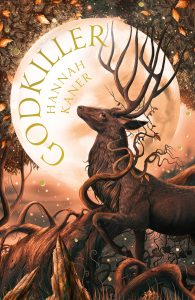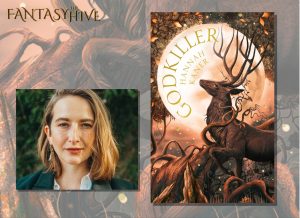Interview with Hannah Kaner (GODKILLER)
Hannah Kaner is a Northumbrian writer living in Scotland. She works as a senior digital consultant in Edinburgh, delivering digital healthcare, tools, and services for the public sector. She has a first-class degree in English from Pembroke College, Cambridge, and a Masters of Science with distinction from the University of Edinburgh. She is inspired by world mythologies, angry women, speculative fiction and the stories we tell ourselves about being human.
Welcome to the Hive, Hannah. Firstly, congratulations on your debut novel, Godkiller! Can you tell our readers a bit about it? What can they expect?
It’s got your hero’s journey, a coming of age, a dash of vengeance and a lot of gods.
Just for fun, can you describe your book in five words?
Mad, bad, dangerous to know.
Godkiller is set in the aftermath of a God War, where our characters are trying to survive in a dark and gritty world where gods and monsters roam. It reminded me very much of The Witcher, was this a source of inspiration to you? What other aspects influenced your worldbuilding?
I hadn’t had the pleasure of reading The Witcher when I first drafted Godkiller. Now, of course, I’ve started chewing through the books because they’re brilliant.
But the influences come from the long history of the quest narrative, the rogue adventurer encountering strange challenges, beasts or beings on a journey, because at its heart Godkiller is a quest. Influences range from The Dark is Rising, The Hobbit, American Gods, Beyond the Deepwoods, Left Hand of Darkness, Princess Mononoke, The Faerie Queene, Gawain and the Green Knight – and of course the Odyssey, the Iliad, and the fall of Troy. In fact I think my first pitch was Gawain and Furiosa go on a quest in the aftermath of fallen Troy.
And that’s another source of inspiration, stories of worlds half fallen or in peril, like the Wheel of Time, Black Leopard Red Wolf, The Final Strife or Lord of the Rings. It felt like both a challenge and a good foundation to ask questions of the world – why is it the way it is? How does that shape the people in it? And the gods? And the quest?
If you were a god, which kind would you be and why?
Oh some kind of small house god of a local village or river I suspect. Maybe a magpie god of fire, fables and wine.
 Let’s talk about your characters! Both Kissen and Elogast are skilled warriors, yet they are both so different from each other. Can you tell us about the inspiration behind their personalities?
Let’s talk about your characters! Both Kissen and Elogast are skilled warriors, yet they are both so different from each other. Can you tell us about the inspiration behind their personalities?
Kissen came first, inspired by this wandering mythological hero, but I wanted her to be all her own. Full of anger, and full of love, and competent as hell. Perhaps a reaction against feeling there were so many helpless female characters in books I had access to as a kid, though now I’d say she’s part of a pantheon herself. Her fighting style had to come out of who she fought – using cunning, brawling and boxing. She’s never been on an even playing field, so she uses every resource she has.
Elo was harder to write, as it took me a while to figure out what made him tick, what would drive him on his journey. Knowing how he would move and wield a blade was easier than figuring out who he was, his drives and motivations. I knew I wanted a knight who was called back into action, and a foil for Kissen, and someone who might change the world out of love and loyalty. But it took me a trip with some friends to Scotland where a pal decided on a whim to bake six loaves of focaccia over three days that I started to get a feel for who else he could be. His tenderness, and loyalty, his sense of humour.
Unlike Kissen, who turns her anger and energy outward, Elo turns it inward. In many ways he’s more complex; he’s smart, educated, could have been wealthy, but has enforced penance on himself. While Kissen needs to learn to see other people (and gods) as worthy, capable, able to make mistakes, Elo needs to find his own worth, his potential, and his power.
How important was it to you to represent disability and mental health through their characters?
It’s an interesting question, I didn’t start Godkiller intending to write a disabled character, or a character with PTSD, but as I sketched the characters, who they were, what they’d experienced, then these became important parts of who they were, how they acted, who they loved and who they hated.
Kissen for example, as I figured out her story, how she survived and what it took for these gods to grant wishes, I realised she would have to have lost a limb, or an ear, or an eye as part of that survival.
And then, understanding I would be writing a disabled character, it was my responsibility to write a decent one. I did a lot of reading, and raised my awareness of frustrating tropes, challenges, and biases there were in writing disability, and worked with authenticity editors.
I didn’t want to tokenise, isolate, or undermine Kissen’s story, so it was most important to me that Kissen would have community, people she sought out, who understood her, that she didn’t face the world alone.
As for Inara and Skediceth, my two personal favourites, how did you find crafting their characters? Was it easy to write from the perspective of a child with a mature voice and a morally ambiguous god, or were there aspects which were tricky?
I loved writing Inara and Skedi and their relationship. I mean – Inara felt pretty easy at first, possibly because I was that wilful and intensely vulnerable know it all as a child. Hers is a journey of self-discovery, and finding her grit, which is such a delight to write.
Her relationship with Skedi was harder, because it comes with problems, a challenging power dynamic, and two people, one a child, one immortal, who are bound together and want and need very different things. I think that tension will play out over the rest of the series. Gods both need and demand human love, so Skedi being loyal to one human above others, above himself, is a paradox.
And, exploring that paradox, it’s so difficult to allow characters you love to be cruel to each other, to hurt each other. I think that was the hardest part to write.
Ok, we have to mention how gorgeous your cover is, the artwork is stunning! How involved in the process were you? Was there a particular aesthetic you hoped they’d portray?
I am still in awe every time I look at it.
For the cover, full credit and imagination for how it has been planned, pitched and pulled together goes to the incredibly talented creative team and my editor at Harper Voyager, as well as the illustrator. To be honest, the peak of my involvement was my editor saying ‘what do you think about this artist?’ and I don’t think I’ve ever said YES PLEASE more quickly in my life.
Tom Roberts is exceptionally talented and meticulous. I love his dark, mythic aesthetic, and knew it would be perfect for the books.
One of our favourite questions here on the Fantasy Hive: which fantastical creature would you ride into battle and why?
Tempted to say dragon, but everyone wants a dragon these days. I’m going to go with a huffing great griffin. A big, vicious, epic catbird.
So Hannah, what can you tell us about the sequel to Godkiller? Any teasers you can share?
Hmm, well, if the first book in a series is A New Hope, then the second will have to be The Empire Strikes Back.
Finally, what is the one thing you hope readers take away from your writing?
A sense of love, anger, and adventure.
Thank you so much for joining us today!
Godkiller is out tomorrow in the UK, and you can order your copy HERE


[…] letzte Opfergabe zerstört. Sie wird hierbei als starke, selbstbewusste Frau charakterisiert, „voller Wut und voller Liebe und höllisch kompetent“, so die Autorin. Ihr Kampfstil ergibt sich aus ihrer Vergangenheit und gegen wen und was sie […]
[…] be enough quest based stories. If you’re considering reading Godkiller, I would recommend this interview with Hannah Kaner on The Fantasy Hive – it’s made me so much more excited to have this […]
Gos killer sounds amazing!